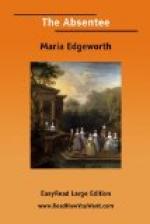‘Such a look of virtuous indignation,’ continued she, ’did I never behold, on or off the stage. Forgive me for laughing, count; but, believe me, comedy goes through the world better than tragedy, and, take it all in all, does rather less mischief. As to the thing in question, I know nothing about it: I dare say, it is not true; but, now, suppose it was—it is only a silly quiz, of a raw young officer, upon a prudish old dowager. I know nothing about it, for my part; but, after all, what irreparable mischief has been done? Laugh at the thing, and then it is a jest—a bad one, perhaps, but still only a jest—and there’s an end of it; but take it seriously, and there is no knowing where it might end—in half a dozen duels, maybe.’
‘Of that, madam,’ said the count, ’Lady Oranmore’s prudence and presence of mind have prevented all danger. Her ladyship would not understand the insult. She said, or she acted as if she said, “JE NE VEUX rien voir, rien ECOUTER, rien savoir.” Lady Oranmore is one of the most respectable—’
‘Count, I beg your pardon!’ interrupted Lady Dashfort; ’but I must tell you that your favourite, Lady Oranmore, has behaved very ill to me; purposely omitted to invite Isabel to her ball; offended and insulted me:—her praises, therefore, cannot be the most agreeable subject of conversation you can choose for my amusement; and as to the rest, you, who have such variety and so much politeness, will, I am sure, have the goodness to indulge my caprice in this instance.’
I shall obey your ladyship, and be silent, whatever pleasure it might give me to speak on that subject,’ said the count; ’and I trust Lady Dashfort will reward me by the assurance that, however playfully she may have just now spoken, she seriously disapproves and is shocked.’
’Oh, shocked! shocked to death! if that will satisfy you, my dear count.’
The count, obviously, was not satisfied; he had civil, as well as military courage, and his sense of right and wrong could stand against the raillery and ridicule of a fine lady.
The conversation ended: Lady Dashfort thought it would have no further consequences; and she did not regret the loss of a man like Count O’Halloran, who lived retired in his castle, and who could not have any influence upon the opinion of the fashionable world. However, upon turning from the count to Lord Colambre, who she thought had been occupied with Lady Isabel, and to whom she imagined all this dispute was uninteresting, she perceived, by his countenance, that she had made a great mistake. Still she trusted that her power over Lord Colambre was sufficient easily to efface whatever unfavourable impression this conversation had made upon his mind. He had no personal interest in the affair; and she had generally found that people are easily satisfied about any wrong or insult, public or private, in which they have no immediate concern. But all the charms of her conversation were now tried in vain to reclaim him from the reverie into which he had fallen.




